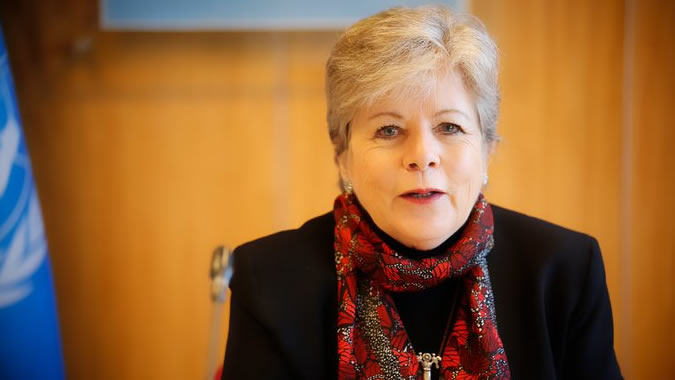Investment in Pharmaceutical Manufacturing and Primary Health Systems is Urgently Needed for a Transformative Recovery in the Region: ECLAC
Work area(s)
The United Nations regional organization’s Executive Secretary, Alicia Bárcena, participated in a virtual event held on the sidelines of the 59th Directing Council of the Pan American Health Organization (PAHO).

The countries of Latin America and the Caribbean must clearly set out their strategies for a transformative recovery with equality and sustainability, centering their investment on key sectors such as pharmaceutical manufacturing and primary health systems, Alicia Bárcena, Executive Secretary of the Economic Commission for Latin America and the Caribbean (ECLAC), indicated today at a virtual event entitled A Comprehensive Response in Health and the Economy to the Protracted COVID-19 Pandemic.
The event, which was held on the sidelines of the 59th Directing Council of the Pan American Health Organization (PAHO), featured remarks by Jarbas Barbosa, Assistant Director of PAHO/WHO; Christopher Tufton, Minister of Health of Jamaica and President of PAHO’s 59th Directing Council; Michael Pearson, Head of Canada's delegation to the 59th Directing Council; and Enrique Paris, Minister of Health of Chile. The event’s moderation and closing remarks were carried out, respectively, by Amalia Del Riego, of Health Services and Access at PAHO/WHO, and James Fitzgerald, Director of Health Systems and Services at PAHO/WHO.
In his opening remarks, Jarbas Barbosa highlighted the start, in 2020, of a work agenda between PAHO/WHO and ECLAC aimed at strengthening technical cooperation in the region’s countries, which includes the preparation of various joint documents. The next such document will be presented on October 7, he anticipated.
During her presentation, entitled “The social and economic impact of the protracted COVID-19 crisis: Regional prospective analysis,” Bárcena posed that the COVID-19 pandemic magnified the structural weaknesses of the health systems in Latin American and Caribbean countries. This region has been the most affected in the developing world, with more than 44 million confirmed cases and nearly 1.5 million deaths, she recalled.
The senior official warned about the increase in global asymmetries, not only in terms of access to vaccines but also the concentration of wealth and the impacts of climate change. Latin America and the Caribbean will not be able to vaccinate 80% of its population in 2021, she affirmed.
The region’s health sector – Bárcena indicated – is characterized by its chronic underfunding, fragmentation and segmentation. Only in Cuba and Uruguay does public spending on health exceed 6% of GDP. The regional average is 3.8%, compared with 7% in the countries belonging to the Organisation for Economic Co-operation and Development (OECD).
High out-of-pocket spending also reflects the insufficient public financing of health in Latin America and the Caribbean, she said. In the region, out-of-pocket spending represents 33.6% of total spending on health, whereas in the OECD countries, the figure is 21%.
“The paradox of economic recovery in Latin America and the Caribbean is that there will be growth (5.9% in 2021 and 2.9% in 2022), but it is insufficient for a sustainable and transformative recovery,” she emphasized, adding that young people and women have been the most affected by the crisis.
In this context, ECLAC proposes eight strategic sectors that promote technical change, create jobs and reduce external constraints and the environmental footprint, including investment in basic services, primary health and in the health-care manufacturing industry, with a regional outlook, she stated.
The senior official pointed up the recent approval by the countries of the Community of Latin American and Caribbean States (CELAC) of the Lines of action and proposals for a plan for self-sufficiency in health matters in Latin America and the Caribbean, a programmatic roadmap prepared by ECLAC at the request of the regional bloc’s pro tempore chair for strengthening the production and distribution of medicines, especially vaccines, among other objectives.
The plan, Bárcena explained, includes seven lines of action: regulatory convergence and recognition mechanisms; a regional clinical trials platform; an immediate mechanism for vaccine procurement at a regional level; consortiums for vaccine development and production; regulatory flexibilities to gain access to intellectual property; the development of a stable regional market for medicines through public procurement, strengthening regional and subregional mechanisms; and universal systems for access to primary health.
In the short term, to cope with the crisis, countries must maintain emergency transfers to the most vulnerable population and support small- and medium-sized enterprises. In the medium term, a new social and fiscal contract is urgently needed that would stimulate investment, employment, equality and climate action, she sustained.
“We have to move towards welfare states. We need to restructure health and education services and advance towards a care society. We cannot give up on regional integration and, likewise, we must overcome the shortage of international solidarity,” ECLAC’s highest authority concluded.
Related content
Type
Country(ies)
- Latin America and the Caribbean
Contact
Public Information Unit
- prensa@cepal.org
- (56 2) 2210 2040